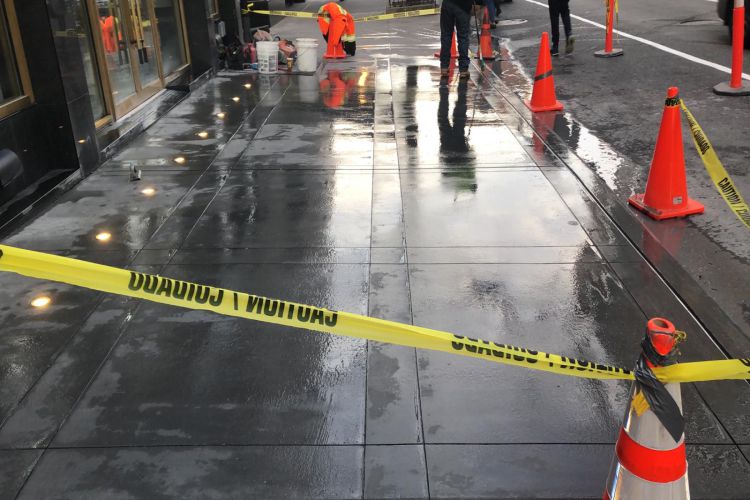Sidewalk violations in New York City are more than just a nuisance—they’re a legal obligation for property owners to address promptly. The NYC Department of Transportation (DOT) mandates that sidewalks adjacent to private properties must be maintained in safe condition. If a sidewalk is found to be cracked, uneven, or otherwise hazardous, the DOT may issue a violation notice requiring the property owner to make repairs. But how much does it actually cost to fix one of these violations? The answer depends on several factors, including the extent of the damage, the materials involved, and whether the city steps in to do the work.
Understanding the Violation Process
When a sidewalk defect is identified, the DOT issues a Preliminary Inspection Report to the property owner. This report outlines the nature of the violation—such as trip hazards, collapsed sections, or tree root damage—and provides a timeframe for repairs. Typically, owners have 75 days to address the issue before the city may intervene. If the deadline passes without action, the city can hire a contractor to perform the repairs and bill the property owner. This invoice can include not only the cost of repairs but also administrative fees and interest if unpaid, potentially resulting in a lien against the property.
Cost Breakdown by Repair Type
The uneven sidewalk repair cost in NYC varies widely depending on the scope of work. For minor crack repairs, property owners can expect to pay between $1 and $3 per square foot. These are the most budget-friendly fixes and often involve patching or resurfacing small areas. For more moderate damage, such as uneven slabs or partial replacements, costs typically range from $3 to $8 per square foot. Full slab replacements, which may be necessary for extensive damage or compliance with ADA standards, can cost anywhere from $5 to $20 per square foot.
The material used also affects the price. Concrete is the most common and affordable option, while brick, asphalt, or bluestone sidewalks tend to be more expensive. Repairs involving specialty materials may require skilled labor and longer timelines, further increasing the cost.
Permit Fees and City Involvement
In addition to repair costs, property owners must obtain a Sidewalk Construction Permit from the DOT. As of 2025, the permit fee is a flat $70 for up to 300 linear feet of sidewalk. Corner lots requiring work on two sides must obtain separate permits for each side. Failing to secure the proper permits can result in additional fines or delays in the repair process.
If the city performs the repairs due to inaction by the property owner, the cost is calculated based on the square footage listed in the violation notice multiplied by the city’s standard rate per square foot. These repairs are typically limited to concrete only, meaning any decorative or specialty materials will not be replaced in kind. The city’s invoice may also include administrative fees, and unpaid balances can accrue interest and become a lien on the property.
Choosing a Contractor
Hiring a licensed contractor is essential for ensuring that sidewalk repairs meet DOT standards. Contractors familiar with NYC regulations can help navigate the permitting process, avoid common pitfalls, and ensure timely completion. While some property owners may be tempted to choose the lowest bidder, it’s important to verify credentials, insurance, and past work quality. A poorly executed repair can lead to future violations or liability issues if someone is injured.
Some contractors offer free estimates and cost calculators to help property owners budget for repairs. These tools can provide a clearer picture of expected expenses based on the size and condition of the sidewalk. However, final costs may vary depending on site-specific challenges such as tree roots, underground utilities, or weather-related delays.
Financial and Legal Implications
Ignoring a sidewalk violation can have serious financial consequences. Beyond the cost of repairs, property owners may face legal liability if someone is injured due to a hazardous sidewalk. Personal injury claims can result in costly settlements or judgments, especially if the defect was documented in a DOT violation notice. Additionally, liens placed by the city for unpaid repair invoices can complicate property sales or refinancing efforts.
Timely and compliant repairs not only protect property owners from legal exposure but also contribute to neighborhood safety and aesthetics. In some cases, repairs may even increase property value by improving curb appeal and demonstrating responsible ownership.
Conclusion
Repairing a sidewalk violation in NYC is a multifaceted process that involves understanding city regulations, budgeting for materials and labor, and navigating permit requirements. While costs can range from a few hundred to several thousand dollars depending on the scope of work, addressing violations promptly is essential to avoid further penalties and legal risks. Whether opting for a private contractor or facing city-imposed repairs, property owners should approach sidewalk maintenance as a critical aspect of urban stewardship. For expert help navigating DOT and DOB sidewalk issues in New York City, trust the professionals at Nycsidewalkviolations.com to get the job done right.

